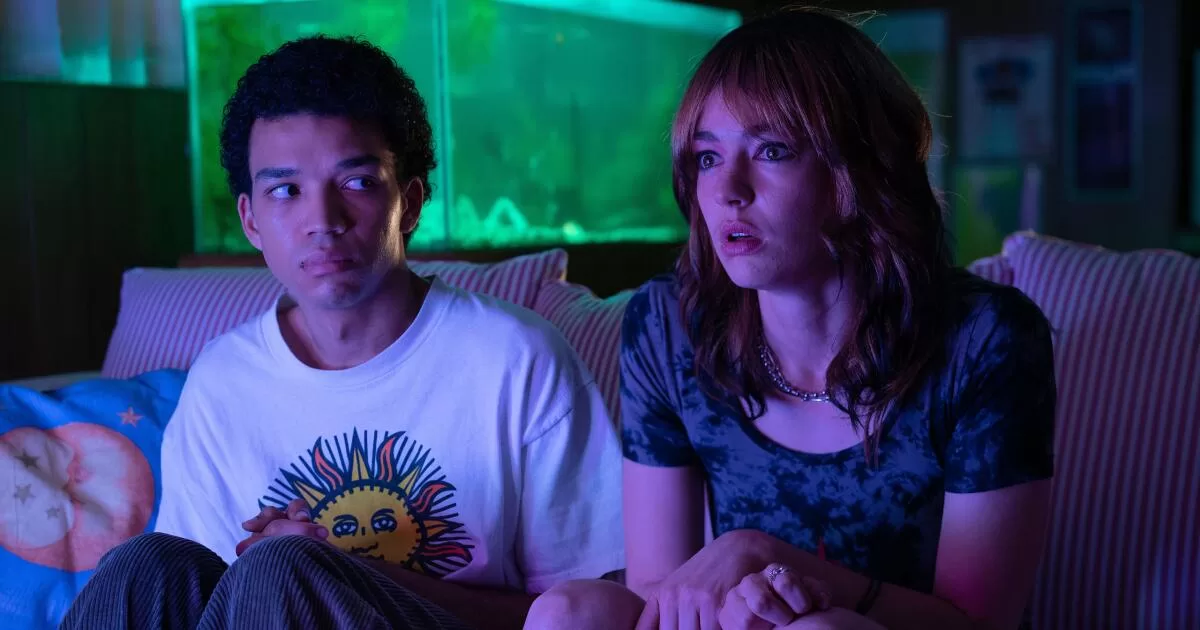The writer and director Jane Schoenbrun is part of a burgeoning group of young filmmakers, like Kyle Edward Ball (“Skinamarink”) and Vera Drake (“The People’s Joker”), who I’ll call the Indoor Kids, as they use their formative pop-culture totems like a terrarium. Their intimate stories play out in someone else’s habitat. Schoenbrun, who debuted with 2021’s similarly hermetic internet chiller “We’re All Going to the World’s Fair,” has a knack for imagery that triggers a Pavlovian response: D.A.R.E. posters, Fruitopia vending machines, election booths offering up Ross Perot or Ralph Nader, and inserted scenes of “The Pink Opaque” that capture the flat, bright fuzziness of ’90s episodic TV. Sense memories of childhood isolation take over like a lucid dream. (The one fumble is the too-modern and twee folk soundtrack by Alex G.)
“The Pink Opaque” stars two summer camp friends, Isabel and Tara (Helena Howard and Lindsey Jordan), who discover that they’re psychic soulmates. Think “Buffy the Vampire Slayer” with a sprinkle of Georges Méliès. Every week, Isabel and Tara fend off a goofy minor villain — clowns, lunar-faced goons, something called a Drainlord — as they build up to defeating the big bad, the resonantly named Mr. Melancholy (Emma Portner). When Owen watches the show with his fellow obsessive Maddy (Brigette Lundy-Paine), an older classmate who guards the walls around their fandom with an impatient, fast-talking ferocity, both teens’ faces are awash in warm pink light. They gawk at an ice-cream monster who drools soft-serve from his gooey fangs. That almost mythical melting atrocity might not be what everyone else sees.
But everything we see is calculated to tickle the recesses of our brainstems. The nostalgic tingle Schoenbrun gets right is the feeling of being engulfed in mysteries. Some puzzles fade with age (what’s everyone else up to after my 10 p.m. bedtime?) while others linger (why did my gym class make us play with parachutes?).
Here, the biggest question is: What makes someone give themselves over to the spell of a show? What’s underneath “The Pink Opaque’s” cheap special effects that keeps Owen gripped? During what looks to us like a pretty corny clown-fighting scene, he glances over at Maddy to find his acquaintance quivering with sobs. They aren’t close enough to talk about it. One hint why Maddy might ache to identify with a fighter comes in a casual warning. If Owen doesn’t leave her living room by morning, Maddy’s stepdad will “break my nose again.” As for Owen’s own dad (a startling cameo by Fred Durst), he’s a distant, intimidating figure usually staring at his own shows on his own TV, grimly making the case that the problem isn’t just generational.
It’d be a stretch to call Owen and Maddy friends and neither is at all interested in becoming something more. Pressed to answer whether he likes girls, Owen sputters, “I think that I like TV shows?” Schoenbrun, a trans artist, has said the boy might have a deeper reason to imagine himself as “The Pink Opaque’s” beautiful and timid Isabel. The film itself isn’t that coy — Owen and Maddy attend classes at Void High School, i.e. VHS — but this point is whispered lightly through parallel cuts of Owen and Isabel walking through forests and a glimpse of Maddy urging him to step into a dress. “The Pink Opaque” is a kids’ show, a girls’ show, Owen is told. If he’s still watching it when he becomes what looks like a caricature of an elderly suburban man, what does that make him?
On its surface level, however, “I Saw the TV Glow” is just about a mope. Owen’s torpor — his froggy, monotone way of talking, his incessant, suppressed discomfort — is draining. The film invents a new emotion: passionate ambivalence. Schoenbrun’s argument might be that this is exactly the response they’re after. They’ve accomplished it, but at the expense of engagement, resulting in a collection of leaden scenes that might make the audience want to claw out of its own skin.
The most aggravating of them is when Owen and Maddy, who only ever have conversations centered on the television show, who only ever relate to the events of their life as though they were in a TV show, who compare the passing of years to the skipping of a DVD chapter, reconnect after some time apart and suffer through this excruciatingly drawn-out line delivery: “Do you remember that show we used to watch together?…it was called…‘The Pink Opaque.’”
In that moment, I could have smashed my own head into the nearest TV. (A harrowing image also seen in here.) Still, the film does end strongly on the idea that one must — must! — ditch their stunted pubescence or risk a breakdown. But the last impossible, unanswerable question it asks is: What happens when you put away childish things and are left with nothing?
‘I Saw the TV Glow’
Rating: PG-13, for violent content, some sexual material, thematic elements and teen smoking
Running time: 1 hour, 40 minutes
Playing: In limited release Friday, May 3
